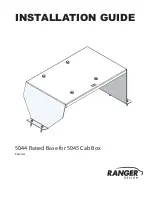
Additional Safety Information
Door Locks
It is not safe to leave your car doors
unlocked. A passenger, especially a
child, could open a door and acci-
dentally fall out. Also, there is a
greater chance of being thrown out
of the car during a crash when the
doors are not locked.
Storing Cargo Safely
Before you drive, make sure you
first securely store or tie down any
items that could be thrown around
the car and hurt someone, or
interfere with your ability to operate
the controls.
Do not put any items on top of the
rear shelf. They can block your view
and they could be thrown about the
car in a crash.
Be sure to keep compartment doors
closed when the car is moving. If a
front passenger hits the door of an
open glove box, for example, he
could injure his knees.
For information on loading cargo,
see page
135
.
Driving with Pets
Loose pets can be a hazard while you
are driving. An unrestrained pet can
interfere with your ability to drive
the car. In a crash or sudden stop,
loose pets or cages can be thrown
around inside the car and hurt you or
your passengers. It is also for their
safety that pets should be properly
restrained in your car.
The recommended way to restrain a
medium-sized or larger dog is with a
special traveling harness. This har-
ness can be secured to the rear seat
with a seat belt. Travel harnesses are
available at pet stores.
A small dog, cat, or other small
animal will be safest in a pet carrier
with rigid sides. Choose a style that
allows you to secure it to the car's
seat by routing a seat belt through
the carrier's handle.
For further information, contact your
veterinarian or local animal protec-
tion society.
Driver and Passenger Safety
















































